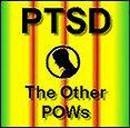
Back in June 2008, Mark Thompson of Time wrote an article about what motivated the Pentagon to even consider granting the Purple Heart for troops diagnosed with PTSD. Although DOD has for now rejected the idea based on negative feedback from a few Veterans Service Organizations, the most resistant being the Military Order of the Purple Heart (an American Legion clone) and of course the Americanism (translated Nationalists) Legion itself.
In the spirit of keeping this debate alive as a means to attacking the STIGMA toward mental illness in our society that’s based more on IGNORANCE than fact or medical/clinical psychological evidence; I’m posted this article plus feedback from the Mental Health community that has to address these issues far beyond the U.S. Armed Forces. The number of such professionals within all branches of military service are miniscule compared to the overall career field in American society.
Robert L. Hanafin
Major, U.S. Air Force-Retired
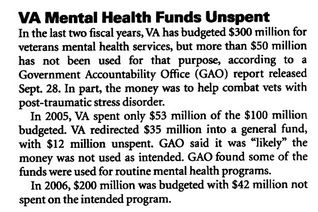 Only two grassroots groups can drive or pressure both Congress, if necessary, and the Pentagon for more immediate action, as professional groups with vested interest.
Only two grassroots groups can drive or pressure both Congress, if necessary, and the Pentagon for more immediate action, as professional groups with vested interest.
One is the medical profession, and the other Military Families and Our Troops on active duty. That is the entire outside profession of the medical and psychological community placing peer pressure on those within the Armed Forces medical community, combined with our troops and military families of the current generation taking PTSD more serious than we do instead of downplaying it to sustain a career and retain stigma.
As evident from a few,but thank God not all, but a few, nationalistic VSOs, Iraq and Afghanistan Vets and families cannot count on the Military Order of the Purple Heart (MOPH), American Legion, VFW or any backward thinking group or organization with a focus on Americanism to look out for our interests nor do they take serious PTSD.
I believe this smoke screen goes a long, long, long way toward the VA making a mockery and JOKE our of PTSD, and ironically Veterans have collaborated in the JOKE and still do either with their silence or collaboration. Once again VVA and VVAW are the only historical exceptions. Let’s pray younger VSOs follow suit. First step, never join a tradtionalist VSO that emphasizes Americanism and politics over Veterans Health Care.
How serious do readers believe the Legion, VFW, and especially the MOPH took Agent Orange, PTSD, and Gulf War Illness back in the 20th century. Not until after Vietnam Era vets began to finally dominate these organizations, and still do, was PTSD given a second though with the exception I believe of Vietnam Veterans Against the War (VVAW) first, and then Vietnam Veterans of America (VVA). That second though was due to the growing number of younger Vets from Vietnam with PTSD. In fact, Vietnam Era vets are still filing claims for PTSD, because of the fact that it and related illnesses can emerge from denial at any point in the future years from the exposure. Denial and stigma play a major part in PTSD during a Vets golden years.
Question is, and it comes not from me but the professionals who deal with mental illness, and the stigma that gets in their way, exactly what medical degrees, experience, or psychological expertise does the American Legion or especially the Military Order of the Purple Heart have that gives them the arrogance to influence such decisions, especially within the 21st century Pentagon?
How many members of the American Legion or Military Order of the Purple Heart are Board Certified Psychiatrists? In fact, I dare any VSO, progressive thinking or not, to present a united front with in-house expertise that says specifically and beyond a doubt that granting the Purple Heart or some other symbolic representation to dignify the hidden wounds of war is not a noble debate. Truth is that most VSOs do not want PTSD dignified, because it runs counter to their Stolen Valor (link) belief system. I equate Stolen Valor to be as credible as the most negative aspects of the dirty politics terms: Swiftboating, and Swifties. It’s a feel good about ourselves, divisive approach, intended to divert from focus on those priorities important to most Vets and Military Families.
It is this vulnerability of lacking professional in house knowledge and expertise, with a few exceptions of VSOs that have traditionally (pun intended) been progressive thinking combined with younger troops and military families standing up alongside the vastly superior Medical and Psychological profession outside the Armed Forces that can place this decision into a debate based on factual evidence NOT ignorance, flag waving or both. Simply put how many former military doctors, especially Psychiatrists and Psychologists are members of the American Legion, MOPH, or VFW in ratio to their number in our overall society?
Several comments, well two thus far, to previous articles I posted on PTSD garnered only responses that continue to downplay the significance of PTSD, and one proclaimed having it. What is all the hoopla about? Well, it ain’t only about medals and ribbons. Take a tally of how many Vietnam Vets really want a Purple Heart for PTSD even if the current debate included grandfathering the award, and it don’t. Just the word hoopla associated with PTSD rings loudly of downplaying an illness some Vet claims to have. The other response was nothing but a shopping list of excuses to not only deny dignity to PTSD by once again downplay it. What’s an intelligent person to do for you? If those of us with PTSD want to contribute to the stigma, then I’m wasting my breath and aggressive/proactive writing style.
That said, and being devil’s advocate, just granting a medal or ribbon for PTSD only takes a baby step towards dealing with the issue of stigma associated with mental illness in our society period. It would be just as much a band aid (again pun intended) just as the purple hearts worn at the Republican National  Convention during 2004 as I believe the Military Order of the Purple Heart remained silent.
Convention during 2004 as I believe the Military Order of the Purple Heart remained silent.
(If anyone can provide me a link to any official statement by the MOPH condemning the mockery of the Purple Heart at the 2004 Republican National Convention, please clarify 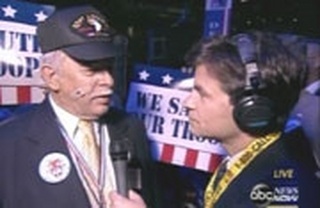 this for me. As the photo at left clearly shows the Vet wearing the 101st Airborne Baseball cap and Purple Heart band aid is a disgraceful message to send, especially with the We Support Our Troops sign as a backdrop. THIS IS THE REAL JOKE. How many Stolen Valor worshippers went out of your way to expose this Bozo as a Fake Veteran? I’m fairly good at Google searches and even checked out the MPOH magazine archive for a documented reaction and found none. For the MOPH to make a statement condemning such action NOW would of course be ludicrous.)
this for me. As the photo at left clearly shows the Vet wearing the 101st Airborne Baseball cap and Purple Heart band aid is a disgraceful message to send, especially with the We Support Our Troops sign as a backdrop. THIS IS THE REAL JOKE. How many Stolen Valor worshippers went out of your way to expose this Bozo as a Fake Veteran? I’m fairly good at Google searches and even checked out the MPOH magazine archive for a documented reaction and found none. For the MOPH to make a statement condemning such action NOW would of course be ludicrous.)
Mark Thompson of the Times wrote that the "Pentagon has diagnosed roughly 40,000 troops with post traumatic stress disorder (PTSD) since 2003, and tens of thousands of others are dealing with it on their own or ultimately will be diagnosed."
With the war taking such a heavy psychological toll, as noted in Thompson’s earlier article, America’s Medicated Army, "some inside the military were and still continue asking if men and women who become mentally injured in the service of their country deserve the Purple Heart. To some traditionalists, the idea is absurd on its face, but it is not a theoretical debate." The Pentagon did consider a change in policy "that would make PTSD, in a term only the military could invent, a "qualifying wound" for the medal."
The so-called traditionalists of the American Legion and its clone the Military Order of the Purple Heart with a mission to spread Americanism have won the first round, because it is up to those inside the military TODAY to challenge old fashion ideas that belong in the 19th and early 20th century with the American Legion and MOPH. The 21st century Armed Forces, just like 21st century Veterans Organizations, must be INNOVATIVE THINKERS not just progressive, forward thinkers for the worst mistake the next generation can make is getting bogged down in flag waving debates that are more political in nature than patriotic. Well, patriotism is a smoke screen for politics.
Thompson goes on to note that the, "Army classifies PTSD as an illness, not an injury, which means it doesn’t qualify for the honor."
So technically speaking the Army has traditionally (pun intended) taken the position of traditionalists Veterans Groups. But hold the phone?
Then, how come the idea of granting the Purple Heart for troops with PTSD even saw the light of day in the 21 st century? This is a very important question younger Veterans and Military Families need to ask themselves even if you disagree with the issue or believe PTSD does not exist. Why? How many of us youngsters, especially on active duty, are seriously considering ever joining the American Legion or MOPH, maybe a few, very few, of us. Respecting an organization or downright tolerating it is not the same as joining it.
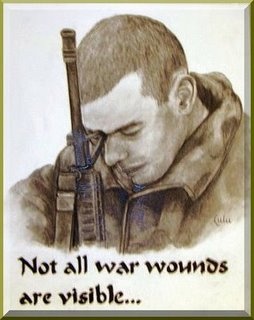 Well, readers, the idea did not come from a VETERAN; at least he wasn’t one when he promoted the idea. It came from someone within the military who was more qualified than any Board Member or Commander of the American Legion or MPOH to make any claims pro or con on PTSD or dealing with stigmatism. These organizations by nature and tradition contribute to that stigma and proudly admit it.
Well, readers, the idea did not come from a VETERAN; at least he wasn’t one when he promoted the idea. It came from someone within the military who was more qualified than any Board Member or Commander of the American Legion or MPOH to make any claims pro or con on PTSD or dealing with stigmatism. These organizations by nature and tradition contribute to that stigma and proudly admit it.
It was an Army psychologist, John Fortunato, at Fort Bliss, Texas, who argued way back in early May 2008 that "PTSD affects soldiers by physically damaging their brains, making the condition no different than conventional wounds. Soldiers with PTSD often have suffered as much as anybody with a traumatic brain injury, as anybody with shrapnel wound," he said. Their ineligibility for a Purple Heart "says this is the wound that isn’t worthy, and it is. Advocates of the change like Fortunato believe it would help encourage soldiers with symptoms of PTSD, many of whom are afraid of being blacklisted and having their chances for promotion limited, fail to seek out the help they need.
Major Hanafin interprets this to mean that granting honorable recognition and extending dignity to those with hidden wounds would do more good than harm in lessening the STIGMA associated with PTSD both in the military and out. It frankly beats taking actions or ignorance that well contributes to the stigma. In fact, the only down side of this debate, but a significant one is that proponents of awards or decs for PTSD bring out the worse in best of those who propose dealing with stigma, and those giving lip service to both stigma and PTSD that both the Pentagon and smarter people than I in our society admits exists. Unfortunately, I’m afraid the debate will do more to encourage or scare those already in denial who desire to maintain a military career and most do that’s why we call it an All Volunteer Armed Force, these troops will remain in denial until it’s either too late for treatment or they kill themselves. That’s the saddest part of contributing to the stigma, in the long run, it is stigma combined with ignorance and fear that leads to the growing number of suicides our military is experiencing during the War on Terror. Thus, just like any other wound directly or indirectly related to combat, PTSD is a killer. That’s a fact that cannot be debated except by those VSOs that do not take PTSD serious.
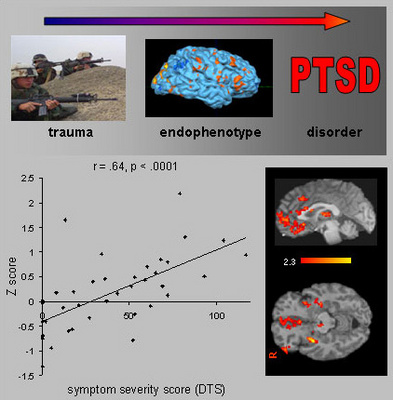 As explaine d to me by a Navy Psychiatrist back during the relative Peacetime of the late 1990s after I returned from the Gulf War passionately in denial about having PTSD, is that PTSD and certain other major or minor depressive illnesses, including bi-polar, are caused by chemical changes in our brains, an imbalance if you will. In fact, this military
As explaine d to me by a Navy Psychiatrist back during the relative Peacetime of the late 1990s after I returned from the Gulf War passionately in denial about having PTSD, is that PTSD and certain other major or minor depressive illnesses, including bi-polar, are caused by chemical changes in our brains, an imbalance if you will. In fact, this military  physician (not a PhD, but an MD) went to a black board and drew me a picture [in laymens terms not as ellaborate as the photo above] of exactly how this imbalance medically works and what it does to our thought processes. That’s why PTSD and so on is treated with medications. If there were no medical and psychological basis to PTSD, then there should be no reason to medicate patients. However, that is what I was taught as a patient, I’m no expert.
physician (not a PhD, but an MD) went to a black board and drew me a picture [in laymens terms not as ellaborate as the photo above] of exactly how this imbalance medically works and what it does to our thought processes. That’s why PTSD and so on is treated with medications. If there were no medical and psychological basis to PTSD, then there should be no reason to medicate patients. However, that is what I was taught as a patient, I’m no expert.
I know that my thesis should have been presented upfront, but what the heck, I don’t get paid to express my opinion, but here goes: THESIS: debate over the PTSD and how to deal with all aspects of it both in American society in general, and within the Mental Health profession within the military must REMAIN within those communities NOT be the debate of amatuers like you and me in Veterans Service Organizations. However, if you VSO has had a significant presence in that community with members who are Board Certified Psychiatrist or at a minimum PhD Psychologist, by all means have at it.
This is why it is paramount that those who are experts within the Armed Forces itself must put aside traditionalists ideas based on ignorance, and politics of getting promoted, or politics period, and do what your profession, especially those of you who took a oath far superior to the Constitution, calls for, because not all of you are going to become Colonels, Generals, or Admirals within the military medical community where the emphasis is on what it takes to get promoted not ethical patient mental care. That is not to say that adequate mental care is not provided, no, I’m saying that is not the main emphasis for any military careerist, the combat mission, comes FIRST.
If there were not vulnerabilities or questionable behavior within or Armed Forces medical community, the case the Walter Reed Fiasco would never have happened let alone gone public. Though tabled for NOW, the suggestion DID garnered high-level Pentagon attention. Mind you despite claims to the contrary, even from me, the DOD does not base all of its decisions on feedback or ignorant input from VSOs. They base their decision on how much it’s going to cost and how many ground troops are they going to lose at a time when more troops are needed for Afghanistan. Military decisions are based on the best needs of the military just ask anyone who has made a career out of it. The image or worth of a medal or ribbon is going to be the lowest common denominator to that decision. If awarding a medal or ribbon will cost nothing plus benefit morale of all troops that is the direction Pentagon uniformed leadership will go with the idea. If awarding the Purple Heart would keep more troops with PTSD in the battlefield the Pentagon would be all for it. However, DOD is not lead by uniformed service members, each Admiral and General reports to a civilian that’s the way of our military. DOD has other means to encourage and keep returning troops with mental illness back into combat. One way of course is join in alliance with traditional VSOs to deny the extent of the damage or downplay PTSD.
Although he backed off more so for political reasons and heat he would get from traditional VSOs, the fact remains that Defense Secretary Robert Gates felt, "It’s an interesting idea," recently noted. "I think it is clearly something that needs to be looked at." The Defense Department’s awards advisory group, which previously ruled and again recently ruled that PTSD doesn’t merit a Purple Heart. That’s NOW, and the War on Terror is far from over. In fact, I believe that the War on Terror will be exploited by all politicians well beyond my death, and I estimate that I have about 20 more years to enjoy life. Robert Gates is a Republican appointee kept on by the Obama Administration, and conservative elements of the Democratic Party. If he a traditionalists himself felt it was an idea worth looking at once he was briefed, just think what a future 21st century thinking SECDEF might do who happens to not be a traditionalist but an innovative THINKER.
Thomps on notes, "Traditional veterans’ groups don’t want the rules loosened. We vehemently disagree that PTSD is a physical wound that warrants a Purple Heart, says Joseph Palagyi, the national adjutant of the Military Order of the Purple Heart, who earned the medal in Vietnam on June 2, 1968. We feel that the purity of the medal must be maintained. The American Legion agrees. "Unless PTSD crosses the line and is shown to be an injury-with a direct relationship to the enemy-we support the current policy," says Phil Riley of the Legion. Michael Wysong, the director of national security issues for the Veterans of Foreign Wars, likens PTSD to the Gulf War syndrome that afflicted troops following that 1991 war. Not to diminish the illness or effects of PTSD," he says, but it is the VFW’s belief that awarding the Purple Heart for PTSD is not consistent with the original purpose and would denigrate the medal."
Where were the medical and mental health experts within the 21 st century Armed Forces when this debate was on-going? I believe they were subordinating their profession oath to the needs of the combat missions in Iraq and Afghanistan a stand that is detrimental to overall patient care, and calls into question their professionalism not as Soldiers but as doctors, psychiatrists, and psychologists.
Proof is in the silence and lack of a proactive approach by at least the Army medical community. When asked his opinion, "The Army surgeon general didn’t venture into this minefield when TIME offered him the opportunity. They haven’t asked my opinion about it," Lieutenant General Eric Schoomaker said May 27, 2008 of the Pentagon panel reviewing the question. When pressed on the question-shouldn’t the Army’s top doc have an opinion on whether or not PTSD warrants a Purple Heart?- he punted. "Whether or not a medal should be awarded is not in my purview," he said. "The senior operational commander in the Army needs to decide that."
The issue can’t get any more controversial or prove where the priorities of senior medical commanders on our Armed Forces are, and it is not on their Hippocratic Oath, that oath comes in second fiddle to what his boss wants. The statements made by General Shoemaker reflects reluctance to seriously deal with PTSD or the stigma associated with it, reinforces reasons why troops will remain in denial until they are forced to become Veterans, or worse dead from their hidden wounds. Our military medical community is in deep kimchee when "the army’s senior doctor" suggests to an investigative reporter that he get, "a second opinion."
Conclusions: (1) The Defense Department’s awards advisory group was persuaded by an open minded, yet conservative, SECDEF to take a look at this twice now, so it is not going away as long as there is a War on Terror. The accountability and credibility of traditional VSOs remains questionable as qualified to make expert decisions on what medical and psychological wounds warrant recognition. In fact, many of these traditionalists rate extremely low on charity watch dog organizations for failure to maintain proper management practices in fund raising. The MOPH and American Legion needs to focus more on proper and efficient management practices and less on lobbying the Pentagon on matters that concern 21st century troops and families NOT 19th and 20th century minded Veterans.
(2) In all fairness and balance, media reports mentioned advocates of the change like Dr. Fortunato, however fails to mention who these other advocates are or exactly how prevalent the views of Dr. Fortunato are within the Armed Forces medical and psychiatric community. Just because that community remains silent doesn’t mean a significant number of professionals do not share Dr. Fortunato’s views. They are just afraid to speak out or just as concerned for their future military career as those troops (combat or not) with PTSD that remain in denial. If it was a minor opinion by a minority of professionals, then why did Robert Gates or the DOD awards board give it any consideration at all? Depending on how many medical professionals both inside and outside the Pentagon agree with Dr. Fortunato, let me assure you the DOD will be looking at this again and hopefully not from a position based on IGNORANCE biased by traditionalism.
(3) The duck and cover silence and distancing of the Army surgeon general was the most disgraceful, because it publicly shows that our Armed Forces definitely is not picking the best and brightest of the medical profession to lead those efforts during a time of WAR. Lieutenant General Eric Schoomaker said it dumber than I ever could have, and this is what outside Medical Professionals are looking at if they agree or not. On May 27, 2008, the General should have, could have just said I wasn’t asked my opinion and left it at that. That response would have been DUMB enough, however to say that, "Whether or not a medal should be awarded for a medical condition is not in my purview, the senior operational commander of the Army [who is not a medical or psychological expert] needs to decide that." DAH, DAH, DAH, DAH, DAH, DUMB!
It is evident that medical leadership in our Armed Forces is subordinate (and I mean that in a negative way) to operational command and that includes issues of professional competence and expertise. Put another way, it’s the same old politics within the puzzle palace. Meaning that in order to get promoted, military medical personnel must compromise their own professional expertise and opinions by recommending that anyone questioning, what military medical professionals are or are not doing or saying, to get a second opinion from their bosses who happen to not be qualified, and who’s focus is on getting and keeping as many ground forces in combat as possible if they have PTSD or not that is a dumb idea. The sad part is that the military medical community could be much better than that and still retain a focus on the combat mission.
http://www.time.com/time/health/article/0,8599,1812757,00.html
Robert L. Hanafin
Major, U.S. Air Force-Retired
Readers are more than welcome to use the articles I’ve posted on Veterans Today, I’ve had to take a break from VT as Veterans Issues and Peace Activism Editor and staff writer due to personal medical reasons in our military family that take away too much time needed to properly express future stories or respond to readers in a timely manner.
My association with VT since its founding in 2004 has been a very rewarding experience for me.
Retired from both the Air Force and Civil Service. Went in the regular Army at 17 during Vietnam (1968), stayed in the Army Reserve to complete my eight year commitment in 1976. Served in Air Defense Artillery, and a Mechanized Infantry Division (4MID) at Fort Carson, Co. Used the GI Bill to go to college, worked full time at the VA, and non-scholarship Air Force 2-Year ROTC program for prior service military. Commissioned in the Air Force in 1977. Served as a Military Intelligence Officer from 1977 to 1994. Upon retirement I entered retail drugstore management training with Safeway Drugs Stores in California. Retail Sales Management was not my cup of tea, so I applied my former U.S. Civil Service status with the VA to get my foot in the door at the Justice Department, and later Department of the Navy retiring with disability from the Civil Service in 2000.
I’ve been with Veterans Today since the site originated. I’m now on the Editorial Board. I was also on the Editorial Board of Our Troops News Ladder another progressive leaning Veterans and Military Family news clearing house.
I remain married for over 45 years. I am both a Vietnam Era and Gulf War Veteran. I served on Okinawa and Fort Carson, Colorado during Vietnam and in the Office of the Air Force Inspector General at Norton AFB, CA during Desert Storm. I retired from the Air Force in 1994 having worked on the Air Staff and Defense Intelligence Agency at the Pentagon.
ATTENTION READERS
We See The World From All Sides and Want YOU To Be Fully InformedIn fact, intentional disinformation is a disgraceful scourge in media today. So to assuage any possible errant incorrect information posted herein, we strongly encourage you to seek corroboration from other non-VT sources before forming an educated opinion.
About VT - Policies & Disclosures - Comment Policy



